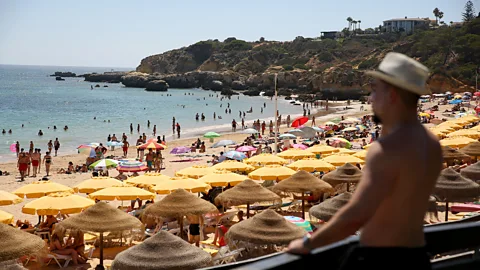New Tourist Fines Are Shaping European Holidays
This summer, several European nations have rolled out severe penalties for tourists who fail to observe local customs and regulations. The enactment of these fines raises questions about their purpose and potential impact on holidaymakers.
Imagine disembarking from a flight to Antalya, Turkey, filled with excitement to begin your vacation. As you unbuckle your seatbelt and leap from your seat to collect your bag, a flight attendant promptly intervenes, issuing a €62 (£54) fine for violating a newly established rule against standing up before the plane has fully reached its destination. Such incidences exemplify the fresh approach European authorities are taking towards unruly tourist behavior.
The Wave of New Regulations
This year, various destinations across Europe are adopting strict regulations aimed at promoting responsible tourism. For instance, in Albufeira, Portugal, wearing swim attire away from the beach could result in fines of up to €1,500 (£1,307). Meanwhile, in Spain’s Balearic Islands—including well-known locales like Mallorca and Ibiza—public drinking could incur fines of as much as €3,000 (£2,615). Even minor infractions, such as reserving beach chairs without occupying them, could add an unexpected cost to your getaway.
Although these regulations may seem counterproductive, especially in tourism-driven economies, local authorities argue that the measures are necessary to protect both residents and well-behaved travelers. Jessica Harvey Taylor, Head of Press at the Spanish Tourism Office in London, emphasized, “These rules, while appearing stringent at first glance, are ultimately about promoting conscious and respectful travel.”
Community Responses
Spanish authorities in Malaga have initiated a campaign called “Improve Your Stay,” disseminated through local buses, billboards, and social media. This initiative seeks to clarify acceptable behavior, including appropriate clothing, reducing noise, and avoiding littering, with fines of up to €750 (£650) for noncompliance.
Albufeira has also introduced a comprehensive code of conduct discouraging public nudity, littering, and other disruptive behaviors. With the visible presence of law enforcement in bustling nightlife zones, compliance is being monitored closely, showcasing serious enforcement rather than mere symbolic fines.
Juan Antonio Amengual, the mayor of Calvià, Mallorca, addressed the issue head-on, stating, “We must balance tourism with the rights of citizens, aiming for harmony between visitors and the local community.”
A Growing List of Offenses
As these fines proliferate, travelers need to be vigilant. Airlines like Ryanair can impose fines of €500 (£435) for disruptive behavior, while inappropriate footwear on hikes in Italy’s Cinque Terre may cost as much as €2,500 (£2,180). France now has an instant €90 (£78) fine for smoking on public beaches and in playgrounds, while Greece imposes a €1,000 (£870) penalty for removing seashells from its beaches.
Guide to Avoiding Fines
| Infraction | Potential Fine | Location | How to Avoid |
|---|---|---|---|
| Driving in flip flops | Up to €300 (£261) | Spain, Greece, Italy, France, Portugal | Wear proper shoes |
| Wearing swimwear off the beach | Up to €1,500 (£1,307) | Barcelona, Albufeira, Split, Cannes, Venice | Cover up before leaving the beach |
| Public drinking | Up to €3,000 (£2,615) | Mallorca, Ibiza, Canary Islands | Drink responsibly |
| Removing seashells | Up to €1,000 (£871) | Greece | Take pictures instead |
| Swimming in a canal | €350 (£305) | Venice | Opt for a gondola ride |
Community Sentiments and Future Implications
According to responsible tourism advocate Birgitta Spee-König, local communities are tired of disruptive tourist behavior. These fines serve as an indication that resident needs must be respected. “While not every fine is unjust, they signal a call for mutual respect,” she notes.
Persistent protests against overtourism have prompted a re-examination of the relationship between travelers and local hosts. Authorities are increasingly stepping up to safeguard not only their residents but also to foster a more respectful atmosphere for all visitors. The ongoing debate illustrates the necessity for travelers to be mindful that vacationing doesn’t grant them a carte blanche to exploit local cultures or environments.


